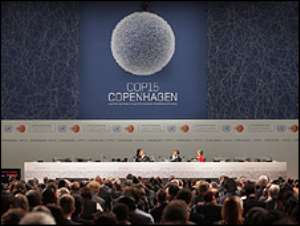
Negotiations at the UN climate summit have been suspended after developing countries withdrew their co-operation.
Delegations were angry at what they saw as moves by the Danish host government to sideline talks on more emission cuts under the Kyoto Protocol.
As news spread around the conference centre, activists chanted "We stand with Africa - Kyoto targets now".
Informal talks continue, and the UN climate convention head said the formal agenda should resume in the afternoon.
Blocs representing poor countries vulnerable to climate change have been adamant that rich nations must commit to emission cuts beyond 2012 under the Kyoto Protocol.
But the EU and the developed world in general has promoted the idea of an entirely new agreement, replacing the protocol.
Developing countries fear they would lose many of the gains they made when the Kyoto agreement was signed in 1997.
Previously during this meeting - formally called the Conference of the Parties (COP) 15 - developing countries have accused the Danish chairs of ignoring their concerns.
"The president of the COP (Danish climate minister Connie Hedegaard) is absolutely committed to violate any democratic processes," said G77 chief negotiator Lumumba Di-Aping as he explained the latest development.
Last week, the Pacific island nation of Tuvalu forced a suspension after insisting that proposals to amend the UN climate convention and Kyoto Protocol be debated in full.
'Losing time'
At a news conference earlier in the day, UK Climate Secretary Ed Miliband said that for the developed world to commit to further cuts under the Kyoto Protocol would be "irresponsible for the climate".
He said it would leave some of the world's biggest emitters without targets for cutting emissions.
Many developing countries have been arguing for a "twin track" approach, whereby countries with existing targets under the Kyoto Protocol (all developed nations except the US) stay under that umbrella, with the US and major developing economies making their carbon pledges under a new protocol.
Kim Carstensen, director of the global climate initiative with environment group WWF, said that much more movement was needed on the Kyoto Protocol negotiations here.
"The point is being made very loudly that African countries and the wider G77 bloc will not accept non-action on the Kyoto Protocol, and they're really afraid that a deal has been stitched up behind their backs," he told BBC News.
While understanding the G77 position, he said the suspension could affect progress towards a deal.
"We're losing time, and that's a serious matter; because for every minute we lose on one issue, the chances of getting to the bottom of the next issue diminish."
The Danish government has yet to make any formal response; but Australian Climate Minister Penny Wong described the suspension as "regrettable".
Yvo de Boer, executive secretary of the UN climate change convention, predicted that the negotiations would get back on track in the early afternoon.
"The vast majority of countries here want to see the continuation of the Kyoto Protocol," he said.
"I'm not aware that any countries are trying to block anything."
An African bloc walkout during prepatory talks in Barcelona in November proved unpopular with other developing countries, in particular some small island nations.
By Richard Black
Environment correspondent, BBC News website, Copenhagen
Originating at news.bbc.co.uk




 2024 elections: Resign if you can't be faithful to party - Sagnarigu NDC PC desc...
2024 elections: Resign if you can't be faithful to party - Sagnarigu NDC PC desc...
 Five arrested, remanded over alleged murder of two police officers at Transacco
Five arrested, remanded over alleged murder of two police officers at Transacco
 Tax exemptions better than incentives for churches – Tax Analyst tell Bawumia
Tax exemptions better than incentives for churches – Tax Analyst tell Bawumia
 Transport Minister sues Law Platform Editor for defamation
Transport Minister sues Law Platform Editor for defamation
 Voter registration: Police arrest NPP Treasurer for Mpohor for registering minor
Voter registration: Police arrest NPP Treasurer for Mpohor for registering minor
 "This nonsense must stop" — Lawrence Tetteh vows to march to Jubilee House over ...
"This nonsense must stop" — Lawrence Tetteh vows to march to Jubilee House over ...
 2024 elections: “If indeed you stand for peaceful elections the time is now for ...
2024 elections: “If indeed you stand for peaceful elections the time is now for ...
 I have the attributes to be president of this country — Bernard Monarh
I have the attributes to be president of this country — Bernard Monarh
 Cecilia Dapaah saga: ‘Turf war’ between AG, EOCO, OSP indicates they’re not ‘cor...
Cecilia Dapaah saga: ‘Turf war’ between AG, EOCO, OSP indicates they’re not ‘cor...
 Ghana will become the first African country to embrace blockchain-powered gover...
Ghana will become the first African country to embrace blockchain-powered gover...
